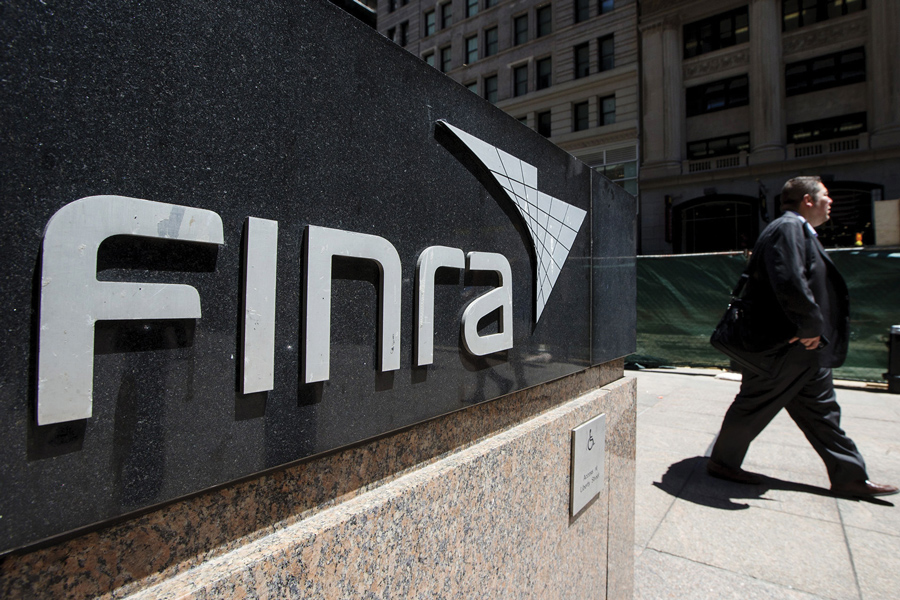

A Finra proposal to rein in brokerages that have a history of violations or hire a number of registered representatives with disciplinary actions has drawn criticism for not going far enough to curb rogue brokers.
Under the measure, which the Financial Industry Regulatory Authority Inc. first released in May 2019, the broker-dealer self-regulator would use numeric thresholds for regulatory disclosures to identify firms that pose a heightened risk to investors. Those “restricted firms” would be required to deposit money into an account controlled by Finra that could be used to fund arbitration awards and for other purposes.
“Finra believes that the direct financial impact of a restricted deposit is most likely to change such member firms’ behavior—and therefore protect investors,” the proposal states. “An added benefit of this proposal would be to preserve member firm funds for payment of arbitration awards against them and their associated persons. The proposal would consider [arbitration claims] and unpaid arbitration awards in determining the size of a restricted firm’s ‘restricted deposit requirement.’”
Finra took public comments on the proposal in the summer of 2019, and later that year its board voted to send a revised proposal to the Securities and Exchange Commission. The SEC must approve Finra proposals. The agency opened its own comment period last November that concluded on Dec. 28.
Several groups asserted that the proposal is too timid to rein in rogue brokers, a problem that has vexed Finra for years.
“While the proposal—trying to minimally regulate firms that specialize in recidivist brokers by making it a little costlier for them to operate—is arguably better than doing nothing, it is nonetheless grossly insufficient and doomed to fail to achieve the purported [Finra] objectives,” Lev Bagramian, senior securities policy advisor at Better Markets Inc., and Michael Hughes, a program assistant, wrote in a Dec. 28 comment letter.
“The harm caused by recidivist wolf-pack firms is crystal clear, and the solution is elegantly simple: de-licensing, barring, and cleaning up the ranks of the brokerage industry of members that choose to sell obviously unsuitable products, cheat, defraud, and harm countless victims and rob them off of their future financial security,” the Better Markets letter states.
The Public Investors Advocate Bar Association said the proposal is a step in the right direction but doesn’t go far enough.
“The proposed measures do not do nearly enough to discourage bad actors from engaging in misconduct nor purge the securities industry of member firms and brokers with a history of misconduct that, by FINRA’s own admission, may be predictive of future misconduct,” David P. Meyer, PIABA president, wrote in a Dec. 28 comment letter. “Further, while the proposed rule allows Finra to consider outstanding unpaid arbitration awards and settlements as criteria when designating a firm as a restricted firm, the rule fails to establish a remedy, such as…requiring these outstanding debts to be paid by the firm prior to depositing funds into a restricted deposit account to cover future obligations, which could preclude the need to consider such criteria in the first place.”
The Securities Industry and Financial Markets Association supports the proposal but said that Finra should be more transparent in how it determines which firms are restricted.
“We believe it is critical that firms have an independent mechanism to replicate Finra’s calculation,” Kevin Carroll, SIFMA managing director and associate general counsel, wrote in a Dec. 29 comment letter. “It would allow firms to self-monitor and self-correct.”
State regulators told the SEC that restricted firms should be publicly identified, a move that is not included in the proposal.
“Requiring public disclosure of this information would be consistent with other disclosure rules discussed below and would allow investors to make informed decisions regarding the individuals and firms with whom they do business,” Lisa Hopkins, West Virginia deputy securities director and president of the North American Securities Administrators Association, wrote in a Dec. 28 comment letter.
The SEC could approve the proposal or modify it and possibly seek further comment. The timeline is unclear.

Integrated Partners is adding a mother-son tandem to its network in Missouri as Kestra onboards a father-son advisor duo from UBS.

Futures indicate stocks will build on Tuesday's rally.

Cost of living still tops concerns about negative impacts on personal finances

Financial advisors remain vital allies even as DIY investing grows

A trade deal would mean significant cut in tariffs but 'it wont be zero'.
RIAs face rising regulatory pressure in 2025. Forward-looking firms are responding with embedded technology, not more paperwork.
As inheritances are set to reshape client portfolios and next-gen heirs demand digital-first experiences, firms are retooling their wealth tech stacks and succession models in real time.
